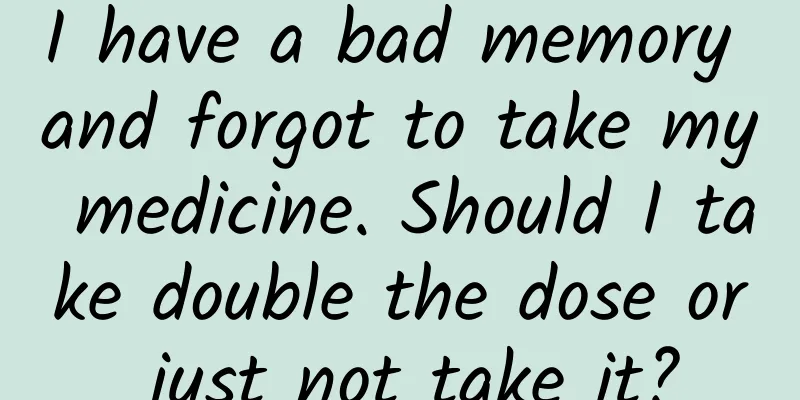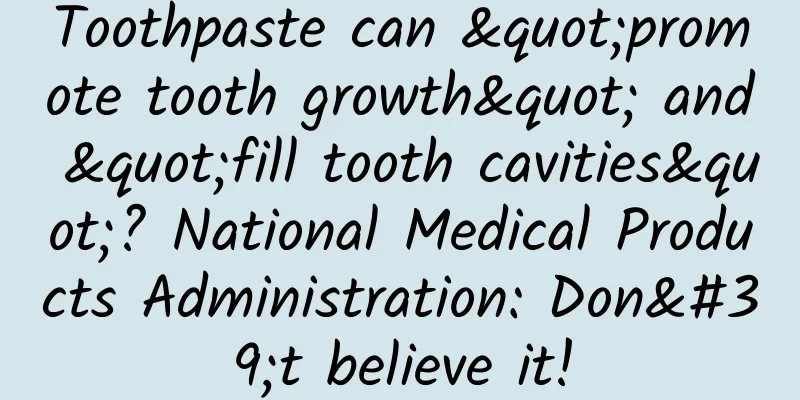I have a bad memory and forgot to take my medicine. Should I take double the dose or just not take it?

|
As people age, many middle-aged and elderly people will have some health problems, such as high blood pressure, high blood lipids, diabetes, and cardiovascular diseases. These chronic diseases are usually difficult to cure completely. If they cannot be effectively controlled under the premise of good lifestyle control, long-term medication is often needed to strengthen disease control. Tuchong Creative In the process of taking medicine for a long time, some elderly friends often encounter such a problem. They should take medicine every day or after every meal, but they forget to take the medicine because they are busy with other things or have a bad memory. Faced with this situation, many friends will feel at a loss: should they take the medicine immediately when they find it? Or should they take twice the amount of medicine next time? In fact, for different medicines and different situations, the remedial measures that should be taken should also be different. Today's popular science article will talk to you about the topic of what to do if the elderly miss taking medicine. Tuchong Creative First of all, it needs to be made clear that for some long-term medications taken by elderly friends, such as antihypertensive drugs, lipid-lowering drugs, hypoglycemic drugs, cardiovascular disease control and risk prevention drugs, etc., if they find that they have missed a dose of the medicine, whether they take it immediately or at the next dose time, they generally do not need to double the dose. Taking medicine is different from eating. If you skip a meal, you can eat more at the next meal. However, for drugs that control diseases, there are usually clear dosage requirements. If you take the prescribed dose, the safety of the medication will be more guaranteed. But if you double the dose, there may be a risk of excessive drug efficacy and increased incidence of adverse reactions. Tuchong Creative This may be too abstract, so let me give you an example: Patient A is a patient with hypertension. He takes sartan antihypertensive drugs regularly every day to control his blood pressure. His blood pressure has been well controlled. One day, he was too busy and forgot whether he had taken antihypertensive drugs, so he took them again. He was worried that he took the medicine too late, so he took 2 tablets instead of one. As a result, more than two hours after taking the medicine, he had symptoms of dizziness, fatigue, palpitations, and cold sweats. He measured his blood pressure and found that it had dropped to 90/60 mmHg. He quickly lay down to rest, and it took a few hours for him to slowly recover. This example is a case of taking too much antihypertensive drugs, resulting in excessive blood pressure reduction and causing hypotension. Low blood pressure not only causes physical discomfort, but also may accelerate the heart rate due to blood pressure dropping too low, leading to cardiovascular events, so special attention should be paid. Therefore, whether it is antihypertensive drugs, or other lipid-lowering drugs, hypoglycemic drugs and other chronic disease medications, generally, except for special circumstances, after missing a dose of the drug, whether it is to make up for it or continue to take the drug at the next dose time, there is no need to increase the dose, so as to avoid unnecessary medication risks due to drug overdose. When it comes to some common medications for elderly friends, how should they make up for the missed doses? According to the classification of some common medications for elderly diseases, let's explain them one by one. 01 Blood pressure medication Hypertensive patients take antihypertensive drugs, and the goal of taking them is to control blood pressure to a stable level and meet the standard. If you are taking long-acting antihypertensive drugs that are taken once a day, if you find that you missed a dose on the same day, you can take it immediately. If you find that you missed a dose on the second day, you can take the medicine as usual the next day. Be careful not to double the dose just because you missed a dose. Tuchong Creative If you are taking short- or medium-acting medications 2 to 3 times a day, and you find that you missed a dose, if it is still a long time before the next dose, for example more than 4 to 6 hours, you can consider making up for it and take the medication normally at the next time. If you find that you missed a dose and it is very close to the next dose, you can take the medication normally at the next time. 02 Statins Statins are commonly used drugs for lowering blood lipids. Currently, the commonly used statins in clinical practice include long-acting statins such as atorvastatin, rosuvastatin, and pitavastatin, as well as short-acting statins such as fluvastatin, simvastatin, lovastatin, and pravastatin. In order to exert the strongest lipid-lowering effect of statins, it is generally recommended to take short-acting statins at night, such as before going to bed, so that the drug can have a better lipid-lowering effect during the period when the liver synthesizes cholesterol most actively at night. For long-acting statins, they work in the body for a longer time, so they are not required to be taken at night, and can be taken at a fixed time every day. Tuchong Creative If you are taking a short-acting statin and find that you forgot to take it before going to bed the night before, there is no need to make up for it in the morning. Statins control cholesterol synthesis, and occasionally missing a dose will not cause a sudden increase in cholesterol and bring risks. Just remember to take the medicine before going to bed the next day. If you are taking a long-acting statin, if you find that you missed a dose on the same day, you might as well make up for it when you find out. The subsequent medication time can be consistent with the make-up time, and you can still take the medicine at a fixed time every day. 03 Diabetes-lowering drugs For missed doses of oral hypoglycemic drugs, what to do also needs to be evaluated and judged based on the drug's mechanism of action and duration of action. For example, ultra-short-acting drugs such as repaglinide used to control postprandial blood sugar need to be taken before meals to achieve the effect of suppressing postprandial blood sugar. If you miss a dose, there is no need to make up for it after meals. You can take the drug before the next meal. This type of drug is taken only with meals, and not without meals. If you don't eat, there is no need to take drugs to control postprandial blood sugar, and there is no need to make up for it after meals to avoid the risk of hypoglycemia. In addition to repaglinide, pioglitazone, acarbose and other drugs that are taken before meals, it is similar. If you find that you forgot to take the medicine after a meal, don't make up for it. Tuchong Creative For some long-acting hypoglycemic drugs that are taken once a day, such as metformin extended-release tablets, linagliptin, glimepiride and other drugs, if you find that you missed a dose on the same day, you can make up for it on the same day, but if you find it the next day, do not double the dose. For SGLT2 inhibitors such as dapagliflozin, which have a certain diuretic effect, if you forget to take it during the day, it is not recommended to make up for it before going to bed, so as not to cause more waking up at night and affect sleep. Just continue to take it at a fixed time the next day. 04 Cardiovascular system medications Many elderly people take long-term medications to control the risk of cardiovascular disease. Common medications include beta-blockers, nitrates, and antiplatelet or anticoagulant drugs. It should be noted that if you miss a dose of beta-blockers used to relieve angina and control heart rate, you must evaluate the duration of the drug's effect and the time interval to the next dose to avoid taking the missed dose too short a time interval, which may lead to drug superposition and the risk of bradycardia. For example, for the long-acting drug bisoprolol, if you find that the interval between the missed dose and the next dose is more than 16 hours, you can take it, but if it is less than 16 hours, you can take the drug at the next time point without taking it again. Tuchong Creative Nitrate drugs, such as isosorbide mononitrate, bind to nitrate receptors in vascular smooth muscle cells to dilate blood vessels, improve blood flow, and relieve symptoms such as angina. If the interval between two doses is too short, the efficacy of the second dose will be affected due to excessive consumption of nitrate receptors in vascular smooth muscle cells during the previous dose. For some friends who need to take nitrate drugs for a long time, if you find that you have missed a dose, you can consider taking it if the interval between the next dose is more than 6 hours, but if the interval is less than 6 hours, you generally don't need to take it. For antiplatelet and anticoagulant drugs, you should also pay attention to the timing of supplementary taking. Generally speaking, if you find that you missed a dose on the same day, you can take it according to the dosage. If you find that you missed a dose the next day, you do not need to double the dose. These four types of commonly used drugs are just examples. There are many common drugs for the elderly that cannot be covered here. For elderly friends who need to take drugs for a long time, how to make up for missed doses should be determined after a comprehensive evaluation based on the characteristics of the drugs and the characteristics of the use of the drugs. In daily life, I also hope that the younger generations at home can give more care to the elderly to reduce the chance of the elderly missing medications. For example, try to choose long-acting drugs that are taken once a day for the elderly, or use some small tricks in life, such as setting a timer reminder on the mobile phone, or using a weekly daily medication box to pack the drugs in advance. These are all good ways to effectively prevent the elderly from missing medications and forgetting to take medications. References: [1] Tian Dan. How to make up for missed medications[J]. Life and Health, 2018 Author | Li Jin, deputy chief pharmacist, deputy leader of the Youth Studies Group of the Medical Committee of the China Science Writers Association Review | Liu Guiyang, Chief Pharmacist, Fourth Medical Center, PLA General Hospital This article is produced by the Science Popularization China-Creation Cultivation Program. Please indicate the source when reprinting The pictures in this article are from the copyright gallery and are not authorized for reproduction. |
<<: Chewing gum can actually open coconuts. It's true that softness can overcome hardness!
Recommend
Spy photos of Trump's most powerful car in history revealed
According to British media reports on November 9, ...
The Douyin advertising platform was launched for the third time. This time, the commission was reduced from 60% to 30%!
After being delayed for more than a month, Douyin...
After QQ lifted the blocking, it banned Taobao and Douyin links again
On the morning of September 17, QQ unblocked the ...
Will you get more wet walking in the rain or running in the rain?
If it rains one day and you don’t have an umbrell...
APP operation: 8 rules to help you quickly find promotion shortcuts
The eight golden rules introduced in this article...
The most comprehensive iOS language learning materials collection
This learning material is prepared for iOS beginn...
China Automobile Dealers Association: In October 2024, MPV models will lead SUVs in value retention rate and surpass sedans to rank second
According to the "China Automobile Retention...
Looking ahead to Android 2017: These innovations are ahead of Apple
2016 is coming to an end, and now it’s time to lo...
Product Analysis Report丨How does WeChat Reading retain users?
I have always believed that reading is a solitary...
Exclusive interview with Hu Yu, Vice President and Director of iFLYTEK Research Institute: Artificial intelligence is once again at the top of the wave
[[133414]] With the development of big data and c...
Five things you should pay attention to when getting App Store editorial recommendations
Appstore is a must-go place for IOS system users ...
Is lupus, the “immortal cancer”, a terminal illness?
Audit expert: Wang Xuejiang Professor of Pathophy...
Beware! Typhoon Mulan is approaching
The reporter learned from the Hainan Provincial M...
Why is live streaming app development so popular?
Nowadays, the development of various mass communi...









